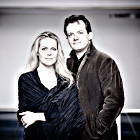ORFEO International – Reviews
Important Releases Briefly Introduced
August 2012
ORFEO 1 CD C 848 121 A
Puccini’s Suor Angelica is one of the composer’s „problem children“. As the central work of Il Trittico, it is sandwiched between two dramatically more effective pieces. 
C 848 121 AA tale of life in a convent and of the suicide of a mother robbed of her child, it simply could not hold its own against its sister works at their world première in New York. 
Kristine Opolais, Andris Nelsons
Foto: Marco BorggreveVarious cuts sanctioned by Puccini testify to his concessions to the conventions of the opera business. Uncut, Suor Angelica lasts just about an hour, and one often hears it in the concert hall today. With its restrained melancholy and mystical ambience, a concert performance does not diminish the impact of the title heroine and her moving fate. On the contrary, when Kristîne Opolais sings Angelica – one of our most exciting young Puccini sopranos (fêted at Covent Garden in Madama Butterfly) – even a concert hall audience is moved to tears, as we can read in the reviews of her concert performances with the WDR Symphony Orchestra of Cologne under Andris Nelsons. Kristîne Opolais’s uniquely shaded timbre, her clear sense of line and her subtle characterization make of Angelica a woman of flesh and blood. Andris Nelsons, too, explores the full breadth of Puccini’s musical language in this one-acter, from its formulaic sacred elements to its uninhibited outbursts of emotion. This becomes especially clear when Kristîne Opolais’s character meets her adversary, the Princess, of whom Lioba Braun with her dramatic mezzosoprano voice offers an extremely authoritarian portrait. Angelica’s sisters in the convent offer several of the best women’s voices from the WDR Radio Chorus Cologne a welcome opportunity for a solo contribution. Above and beyond this there are the luxurious voices of the dark-toned mezzosoprano Nadezhda Serdyuk as the stern Sister Monitor and of Mojca Erdmann’s clear, graceful soprano as Sister Genovieffa. With the exception of the audience as mentioned above, it is she who brings the greatest sympathy for the plight of Angelica.
top |